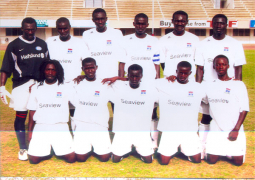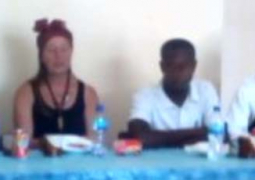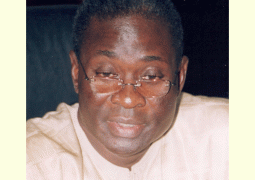A day’s consultation meeting on the Joint UN Programme on HIV was recently organised by the UNAIDS at the SunSwing Beach Hotel.
The meeting allowed partners from the UN System, civil society organisations, members of the HIV support groups to share the Joint Programme on AIDS and to solicit support and guidance in its implementation.
It would be recalled that in December 2011, the United Nations Country Team in The Gambia embarked on the process of developing a Joint Programme on AIDS.
The Joint Programme on AIDS is one of the mechanisms of implementing the United Nations Development Assistance Framework-UNDAF-2012-2016.
The implementation of the Joint Programme is in line with the UN Commitment on Delivering as One and the operationalization of The Three Ones Principles in The Gambia in line with the Paris Declaration on Harmonization, Alignment and Coordination.
In his statement on the occasion, Dr Babagana Ahmadu, the FAO representative and chair of the UN HIV/AIDS Theme Group, said that over the past 30 years, AIDS has united the global community in a way that few other crises have.
This, he said, is clearly manifested in The Gambia through the meaningful partnership with government, civil society, multilateral, bilateral, private sector, and individuals and societies of people living with and or affected by AIDS.
“The disease galvanizes grassroots groups to fight for the human rights of some of the world’s most vulnerable people and ensure universal access to quality prevention, treatment, care and support services,” he said.
AIDS, Dr Ahmadu noted, generated new levels of solidarity between all and has inspired innovations across a wide range of programmes, all geared towards ensuring the development and implementation of effective services to curb the further spread of the disease, to ensure quality, accessible, affordable and uninterrupted treatment, care and support services, to restore hope, alleviate pain and end suffering among people living with HIV, orphans, vulnerable children and those affected.
He recalled that the United Nations General Assembly’s high level meeting held in New York in June 2011 on Aids when the world looked at the success and failures over the past three decades and formulated plans for a future of zero new HIV, zero discrimination and zero AIDS-related deaths.
“AIDS advocacy for developing countries has focused largely on fostering leadership and mobilizing adequate financial resources to scale up the response,” he indicated.
This focus, he said, remains necessary and urgent today because of the global financial, fuel and food crisis.
“However, we are further challenged to work efficiently and in partnership to ensure the maximization of resources as each key player has a unique and comparative advantage,” he said. “After all AIDS is the problem and all of us are the solutions, because we all have different expertise, and the expertise cannot make any difference unless we work together in a coherent and coordinated manner.”
The impact of HIV/AIDS, Dr Ahmadu went on, has been well documented since the advent of the disease and sub-Saharan
He said further: “The implementation of the joint programme on AIDS is a very important mechanism to achieving the guiding principles for improving coordination of national AIDS interventions commonly known as the Three Ones.
“One agreed AIDS action framework that provides the basis for coordinating the work of all partners, one national AIDS coordinating authority with a broad-based multisectoral mandate and one agreed country-level monitoring and evaluation system.”
Alieu Jammeh, director of NAS, in his opening remarks, said government responded to the emerging HIV/AIDS outbreak with a health sector response by initiating the National Aids Control Programme.
He said The Gambia is sill classified among the low prevalent of HIV but said stigma, which is a matter of attitude, is really a challenge. He therefore called on all to have the same sense of direction towards the national response.
He also called on partners to pull resources together to ensure the national response meets its quality target.
Victoria Ginja of the UN System said the UN System will be providing technical support in their areas and will align with government on priority areas, monitoring and evaluation, joint intervention and common challenges.
In his closing remarks on the occasion, Health Services Director Mamadi Cham thanked UNAIDS for organizing such a meeting, which is a good landmark to discuss on issues and on how to improve performances and realize the goals in the fight against HIV.
The occasion was chaired by UNAIDS Country Director Nuha Ceesay.





